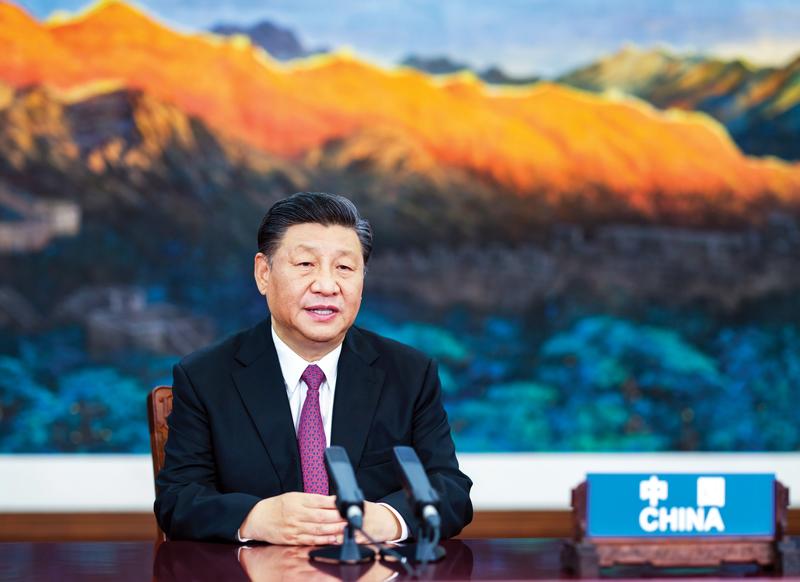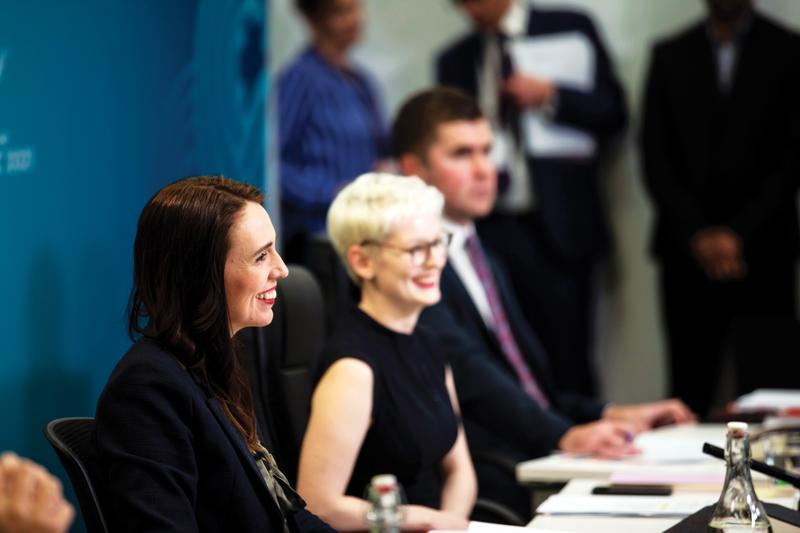 President Xi Jinping addresses the Informal Economic Leaders’ Retreat of the Asia-Pacific Economic Cooperation via video link in Beijing on July 16. (LI XUEREN / XINHUA)
President Xi Jinping addresses the Informal Economic Leaders’ Retreat of the Asia-Pacific Economic Cooperation via video link in Beijing on July 16. (LI XUEREN / XINHUA)
President Xi Jinping highlighted on July 16 the need for Asia-Pacific Economic Cooperation economies to enhance solidarity and cooperation to overcome the impact of COVID-19 and boost global economic recovery, as he announced a package of aid measures for other developing nations.
China will provide another
$3 billion in international aid over the next three years to support COVID-19 response and economic and social recovery in developing countries, the president announced in a speech delivered via video link at the APEC Informal Economic Leaders’ Retreat.
It was the first time in APEC’s history that the leaders had held an extraordinary meeting, which was convened by New Zealand as this year’s chair.
The president put forward China’s proposals in four aspects, noting that controlling the pandemic still poses a difficult challenge and global economic recovery is still on shaky ground.
He urged APEC economies to strengthen international cooperation on COVID response, saying that China supports waiving intellectual property rights on COVID-19 vaccines, and will work with other parties to push for an early decision by the World Trade Organization and other international institutions.
“We must stick to solidarity and cooperation as we go through this difficult time and jointly work for a healthier and brighter future for humanity,” he said.
China has provided over 500 million doses of vaccines to other developing nations, and the nation will take an active part in cooperation initiatives to keep vaccine supply chains stable and safe and support the movement of essential goods, Xi said.
He also pledged to adopt effective measures to ensure healthy, safe and orderly people-to-people exchanges and restore normal business cooperation in the APEC region at an early date.
Beijing has financed the founding of a sub-fund on APEC cooperation on combating COVID-19 and economic recovery, which will help APEC economies win an early victory over COVID-19 and achieve economic recovery, he said.
Xi reiterated the importance of promoting the liberalization and facilitation of trade and investment and upholding the multilateral trading system with the WTO at its core.
“We must remove barriers, not erect walls. We must open up, not close off. We must seek integration, not decoupling. This is the way to make economic globalization more open, inclusive, balanced and beneficial for all,” he said.
He also called for steps to advance regional economic integration, with a view to establishing a high-standard Free Trade Area of the Asia-Pacific at an early date.
China supports APEC in advancing cooperation on sustainable development, improving the list of environmental goods eligible for tariff reductions, and making energy more efficient, clean and diverse, Xi said.
It is important to promote inclusive trade and investment, support the development of small and medium-sized enterprises, scale up support for women and other vulnerable groups, share experience on eliminating absolute poverty and strive to deliver the 2030 Agenda for Sustainable Development, he said.
The president also stressed the importance of seizing opportunities in scientific and technological innovation, noting that the digital economy is an important area for the future growth of the world economy.
“Win-win cooperation is the only right way forward, while a closed-door policy, exclusion, confrontation and division would only lead to a dead end,” Xi said.
He urged steps to further develop digital infrastructure and work for a digital business environment that is open, fair and nondiscriminatory, adding that China will host a workshop on digital capacity building and take forward initiatives such as bolstering the recovery of the tourism sector with digital tools.
 New Zealand PM Jacinda Ardern (left) calls for sharing vaccines while hosting the APEC informal leaders’ meeting from Wellington. (PHOTO / XINHUA)
New Zealand PM Jacinda Ardern (left) calls for sharing vaccines while hosting the APEC informal leaders’ meeting from Wellington. (PHOTO / XINHUA)
As China embarks on a new journey toward fully building a modern socialist nation, the country will build a new system of an open economy with higher standards, create a more attractive business environment, and advance high-quality Belt and Road cooperation, Xi said.
“We hope to work with countries in the Asia-Pacific and beyond to achieve higher-standard mutual benefit and win-win cooperation,” he said.
Xi’s APEC address garnered international praise.
Dicky Budiman, an epidemiologist at Griffith University in Australia, said Xi’s speech demonstrated China’s commitment to “supporting global vaccine cooperation and in waiving the intellectual property rights on COVID-19 vaccine”.
Budiman said this is “very important” for lower- and middle-income countries, many of them in Asia and in Africa, as it will “give (their populations) protection from the virus”.
“Xi also called for global cooperation to end the pandemic. It’s time for all countries to have strong collaboration, because we can’t let other countries be left behind,” Budiman said.
Andy Brooks, general secretary of the New Communist Party of Britain, hailed China’s leading role in tackling the global pandemic and providing immense assistance to other countries in the battle against the coronavirus.
“We are indeed a ‘global village’, and, if we stand together, we can overcome the COVID-19 plague. Hopefully, the countries of the industrialized West will now support the Chinese proposal to waive intellectual property rights on COVID-19 vaccines to speed the global recovery,” Brooks said.
Dennis Munene, executive director of the China-Africa Center at the Africa Policy Institute, said Xi’s remarks sent a message against the “incoming order of vaccine imperialism”, advocating for “peaceful cooperation among civilizations in a time of adversity”.
To defeat the coronavirus and boost vaccination worldwide, Munene said, China has pledged to work with other parties and “take an active part in cooperation initiatives to keep vaccine supply chains stable and safe and support the movement of essential goods … through adhering to the principles of multilateralism”.
Yuzo Tanaka, a professor of economics at Ryukoku University in Kyoto, said China’s pledge to set up an APEC fund for pandemic response “will facilitate a speedy and balanced recovery between haves and have-nots”.
He added that the move is “in the common interests and moral duty of all APEC members because “some countries in the region are quick in vaccination and restarting the economy, while others are scrambling for vaccines, suffering from recurrent surges of infections and lagging behind in economic recovery”.
Ronnie Lins, director of the China-Brazil Center for Research and Business, said Xi’s speech is of great significance as it provides a feasible plan for the international community to cooperate in fighting the COVID-19 pandemic and promoting economic recovery.
As to the negative impact of the pandemic on the world economy, Lins said that only by promoting multilateralism can the global economy recover sooner. The China-proposed Belt and Road Initiative will help enhance cooperation among countries along the routes, he added.
Joe Thomas Karackattu, associate professor at the Department of Humanities and Social Sciences and faculty-in-charge of the China Studies Center at Indian Institute of Technology Madras, said Xi’s focus on the revival of economic growth under the current circumstances was “encouraging”.
“This is encouraging as he focused on many opportunities (that are present even in the middle of the pandemic). (The opportunities include) the rise of digital economies, more vaccine outreach, and other tourism opportunities,” Karackattu said.
Wayne Huang, principal of the Institute of Commercial Education New Zealand, expressed his belief that China will play an important role in promoting an inclusive, sustainable and resilient recovery in the Asia-Pacific region and the rest of the world.
“China’s rapidly developing economy and its large consumer base provide a huge market for the Asia-Pacific region and the rest of the world,” he said.
Xu Wei, Zhao Ruinan in Beijing and Xinhua contributed to this story.
Contact the writers at prime@chinadailyapac.com


